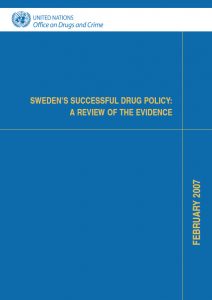 Sweden (and Iceland) have a proven success in solidly reducing drug use, where education and rehabilitation are central.
Sweden (and Iceland) have a proven success in solidly reducing drug use, where education and rehabilitation are central.
Sweden made coerced rehabilitation and school education centrepieces of their restrictive drug policy with the result that their drug use dropped from the highest levels in Europe to the lowest in the developed world.
In 1969, Sweden concentrated heavily on law enforcement measures, but it also looked at demand reduction issues, particularly the provision of treatment services, establishing a demand reduction program operated by youth organisations. An advertising and promotion campaign was launched with literature distribution, newspaper and media advertising. The maximum penalty for serious narcotics offences was increased.
Finally, in 1984 the government adopted its vision toward creating a ‘Drug Free Sweden’. Organisations, political parties and youth organisations encouraged all the community to play an active role, stating: “Everybody who comes in contact with the problem must be engaged. The authorities can never relieve [individuals] from personal responsibility and participation. Efforts by parents, family and friends are especially important. Also, schools and non-governmental organisations are important instruments in the struggle against drugs.”
A study conducted in 2000 supported the view that the new, tougher policy had had a preventive effect on drug use.
A report by the UNODC praised Sweden for having one of the lowest drug usage rates in the western world, and attributed this to a drug policy that invested heavily in prevention and treatment (including free community services), as well as in strict law enforcement.
The Swedish drug policy has the support of Swedes. The priorities are:
* Coerced rehabilitation
* Education
* Maintenance of criminal sanctions
 This means that decriminalisation of drug use is seen as an impediment to seeking a drug-free society.
This means that decriminalisation of drug use is seen as an impediment to seeking a drug-free society.
READ MORE
Sweden National Association for a Drug-Free Society (RNS): The Swedish Drug Policy Experience: Past to Present
United Nations Office on Drugs and Crime (UNODC): Sweden’s Successful Drug Policy – A Review Of The Evidence
Iceland reduced its illicit drug use by 50% by concentrating on resilience-based education in their schools.
READ MORE
Harvey Milkman, Professor Emeritus, Metropolitan State University of Denver: Iceland succeeds at reversing teenage substance abuse. World should look!
